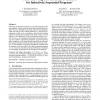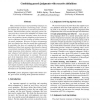1131 search results - page 8 / 227 » Logic Programming, Functional Programming, and Inductive Def... |
118
click to vote
ICFP
2005
ACM
15 years 8 months ago
2005
ACM
Narrowing-driven partial evaluation is a powerful technique for the specialization of (first-order) functional and functional logic programs. However, although it gives good resu...
118
click to vote
JLP
2007
15 years 2 months ago
2007
Several induction theorem provers were developed to verify functional programs mechanically. Unfortunately, automatic verification often fails for functions with accumulating arg...
114
click to vote
WFLP
2000
Springer
15 years 5 months ago
2000
Springer
Abstract. Traditionally, machine learning algorithms such as decision tree learners have employed attribute-value representations. From the early 80's on people have started t...
111
Voted
CORR
2008
Springer
15 years 2 months ago
2008
Springer
Many semantical aspects of programming languages are specified through calculi for constructing proofs: consider, for example, the specification of structured operational semantic...
155
click to vote
CORR
2008
Springer
15 years 2 months ago
2008
Springer
Abstract. Proof search has been used to specify a wide range of computation systems. In order to build a framework for reasoning about such specifications, we make use of a sequent...


